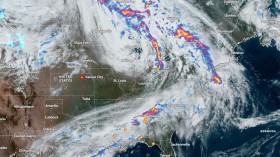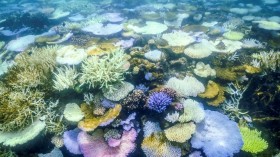Eleven short-finned pilot whales found dead Sunday near Key West, Fla. had the same markings as whales in the larger pod of 51 whales that stranded last week in a remote area of Everglades National Park, a NOAA official said Monday afternoon, confirming the deceased whales are part of the same group.
The 11 whales were spotted on Snipe Point, about 6 miles north of Sugarloaf Key in southern Florida, about 80 miles south of the beach where the pod was initially reported stranded Tuesday, according to Blair Mase a marine mammal stranding network coordinator for NOAA, who spoke to reporters in a conference call.
By the time rescue workers arrived on the site Monday, all 11 of the whales were deceased, Mase said, adding that they were all beached within feet of one another.
Of the 51 stranded whales reported last week, 22 are dead and the remaining 29 are unaccounted for as of Monday afternoon. Eleven of the whales were dead by Fri., Dec. 6 - the last time living members of the pod were seen. Two Coast Guard aerial surveys Saturday did not locate any whales, and Sunday the 11 additional dead whales were found.
Of the deceased whales, all of the adults were female, the remaining juvenile and calf whales were both genders, Mase said. Two of the females were pregnant, Mase added.
Necropsies will be preformed on the deceased whales, Mase said, noting that this set of 11 is in better condition for necropsy than the previous set. The necropsies, the results of which will take weeks to come in, will test for morbillivuris, other possible diseases, toxins, blood contaminants, and biotoxins.
Morbillivirus, the measles-like virus that caused hundreds of bottlenose dolphins to die along the mid-Atlantic coast this summer, has been reported in dolphins in Florida and short-finned pilot whales are known to contract it. Results of the necropsies will reveal whether morbillivirus played a role in the whales' deaths.
Sunday Mase said there are reports of red tide going on in the southwest Florida coast. Red tide -- large algal blooms known for turning water a rusty color -- produces toxins and deplete sea water of dissolved oxygen, which could, in theory, have killed the whales.
"That's something we are going to be testing for," she said, "but at this time it's not suspected" to be the cause of death.
Mase added that the Navy told NOAA that it was not conducting any sonar tests in the area where the whales stranded.
Typically dwelling in water up to 1,000 feet deep, the wayward pilot whales have been out of their home range for nearly a week. While what is causing the whales to strand is unknown, Mase said that if disease is not killing them, by now they will start to succumb to the effects of being out of their home environment. Many of the beached whales showed signs of being emaciated, which could be a sign of disease or an effect of being out of native waters.
"At this point we don't know what the cause [of death] is," Mase said.
© 2024 NatureWorldNews.com All rights reserved. Do not reproduce without permission.

![Microplastics Escape Body's Gut to 'Infiltrate' the Brain, Kidneys and Liver [Study]](https://1471793142.rsc.cdn77.org/data/thumbs/full/70195/280/157/50/40/microplastics-escape-bodys-gut-to-infiltrate-the-brain-kidneys-and-liver-study.jpg)



